Artificial intelligence as a service (AIaaS) companies use a combination of AI technology and the “as a service” model to deliver advanced solutions to businesses that may not otherwise be able to handle the complexities, costs, and skill requirements of implementing AI.
Many businesses use at least one cloud-based AI service, and since few of these organizations have the in-house expertise to do this work effectively, they outsource their AI needs to third-party vendors. Consequently, AIaaS companies have become a crucial part of building a successful AI strategy.
Here are my picks for the best AI as a service companies:
- IBM: Best for Automating Complex Processes
- Amazon Web Services (AWS): Best for Features and Global Presence
- Microsoft: Best for Developers and Data Scientists
- Google: Best for Data Preparation and Management Resources
- OpenAI: Best for Generative AI
- NVIDIA: Best for AI Hardware and Infrastructure Expertise
- ServiceNow: Best for IT and Business Workflows
- Salesforce: Best for Marketing and Sales Teams
- MonkeyLearn: Best for Text Analysis
- DataRobot: Best for Hands-On Support
- H2O.ai: Best for Industry-Specific Service Solutions
- Oracle: Best for Custom Business Use Cases
Featured Partners: AI Software
Top AIaaS Company Comparison
| Use Case | Computer Vision | Audience Size Focus | Free Tier Available | Pricing | |
|---|---|---|---|---|---|
| IBM | Automating complex processes | Yes | All business sizes | Yes | High-end |
| Amazon Web Services (AWS) | Features and global presence | Yes | All business sizes | Yes | Low-end |
| Microsoft | Developers and data scientists | Yes | All business sizes | Yes | Moderately priced |
| Data preparation and management resources | Yes | Primarily midmarket and enterprise | Yes | Moderately priced | |
| OpenAI | Generative AI | Yes | All business sizes | Yes | Moderately priced |
| NVIDIA | AI hardware and infrastructure expertise | Yes | Primarily midmarket to enterprise | No | High-end |
| ServiceNow | Workflow automation | No | Enterprise | No | Moderately priced |
| Salesforce | Marketing and sales teams | Limited | Primarily midmarket and enterprise | No | Moderately priced |
| MonkeyLearn | Text analysis | No | Primarily SMB and midmarket | No | Moderately priced |
| DataRobot | Hands-on support | Limited | All business sizes | No | High-end |
| H2O.ai | Industry-specific service solutions | Limited | Primarily SMB and midmarket | Free Trials Only | High-end |
| Oracle | Custom business use cases | Yes | Enterprise | Yes | High-end |
TABLE OF CONTENTS

IBM
Best for Automating Complex Processes
Long a teach leader, IBM has emerged as an early AI leader with services that it offers under the umbrella of IBM Watson and watsonx. Watson is an AI system that combines natural language processing, machine learning, and other advanced technologies to analyze and understand large amounts of data. It has been used in various industries, including healthcare, finance, retail, and customer service, to provide insights, make recommendations, and assist with decision-making.
You can select from a variety of prebuilt apps from IBM Watson, including watsonx Orchestrate, for automating complex processes. Because of the depth and maturity of IBM’s offering, the company excels at automating even the most highly configured complex systems.
Rounding out the IBM AIaaS offering is conversational AI through natural language prompting, watsonx Assistant for building and commissioning virtual agents, watsonx Code Assistant to help developers with AI-generated code, and Watson Discovery for content analysis in business documents. The IBM Garage is a solution that enables co-creation of solutions between IBM professionals and clients.
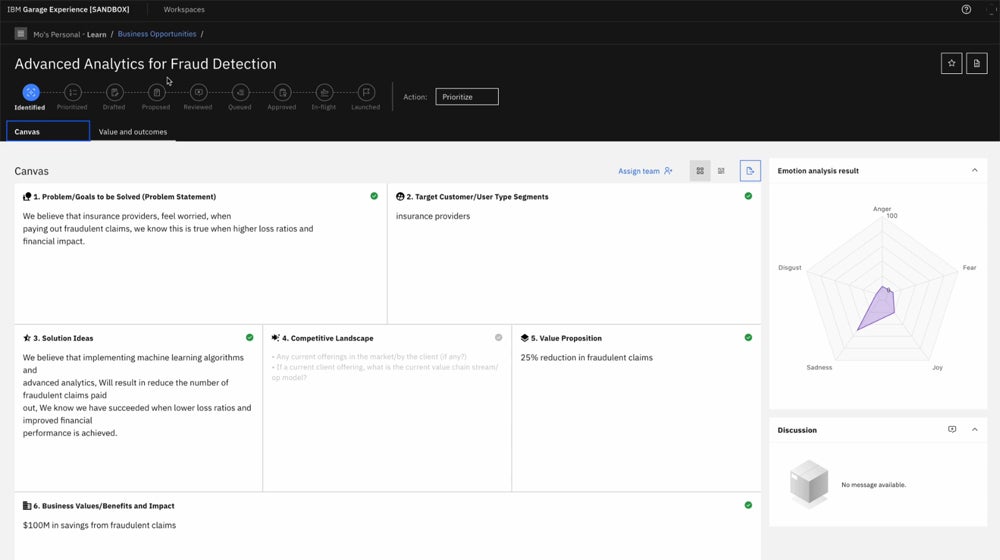
Pros and Cons
| Pros | Cons |
|---|---|
| Smooth process for natural language code generation | Steep learning curve |
| Speedy data discovery capabilities | Expensive for small-business budgets |
Pricing
IBM charges different rates for its various products and services within its AIaaS offerings:
- The IBM watsonx Orchestrate base edition costs approximately $1,500 per month
- watsonx Assistant is available in a free version up to a higher, custom-priced enterprise version
- The base Watson Discovery Plus plan starts at $500; the Enterprise plan starts at $5,000
- Contact the IBM sales team to get the actual rate for your selected AI services or products
Key Features
- Natural language processing (NLP) and model development
- AI developer tools and APIs
- Data and model governance capabilities
- Advanced, AI-powered text, image, and video analytics
- IBM Garage for co-creation among IBM experts and customers

Amazon Web Services (AWS)
Best for Features and Global Presence
Amazon Web Services (AWS) is a leading provider of cloud computing and AIaaS services. The company offers various AI and ML services that can be segmented into different categories, including computer vision services like Amazon Rekognition, an image and video analysis tool, and Amazon Lookout for Vision for detecting defects and automating inspection. AWS also offers language AI tools such as Amazon Lex, a tool for building chatbots and virtual agents, and Amazon Transcribe for automatic speech recognition and other speech-to-text projects.
The company has also done extensive work to advance its generative AI products and services, including Amazon Bedrock and Amazon Q. Specifically with the announcement of Amazon Q, AWS made it clear that it is working to develop services and functions across all three layers of the generative AI stack: bottom-layer infrastructure, middle-layer for building, and top-layer with useful applications.
AWS offers hundreds of services worldwide, with data centers in multiple regions; its large reach supports its AIaaS offering. The company’s strategic plans for full-stack AI innovation make it an ideal choice for companies seeking an AI service provider with a true enterprise-ready presence. It also offers its products and services at a wide variety of price points. For instance, the AWS Free Tier is one of the most generous service tiers on the market, giving businesses with all different budgets the opportunity to work with enterprise-level experts and partners.
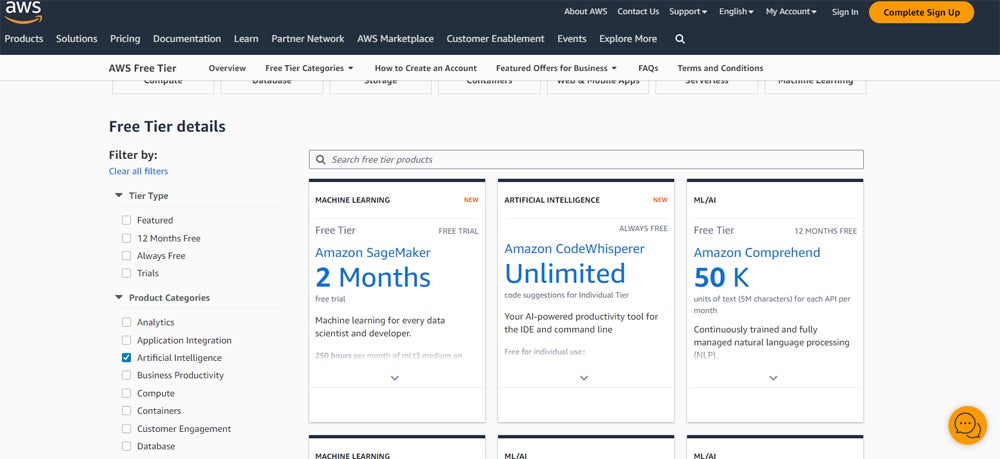
Pros and Cons
| Pros | Cons |
|---|---|
| Global presence and cost-effectiveness | Confusing billing process |
| Unlimited server capacity | Technical support fees required |
Pricing
The amount you pay for AWS’s AIaaS products and services depends on your selected service:
- A limited free tier of solutions is available
- Use the AWS calculator for an estimate
- Contact the AWS sales team about custom services and implementations
Key Features
- AWS marketplace online store for software and applications
- AWS Free Tier with AI, ML, and other enterprise technology solutions
- Access to third-party models and generative AI building tools in Amazon Bedrock
- Amazon Q generative AI assistant for software development and business data management
- Code and DevOps services for application and code optimization

Microsoft
Best for Developers and Data Scientists
Azure AI is a portfolio of AI services from Microsoft built for data scientists who have the coding knowledge necessary to create custom and unique versions of existing Azure solutions. These data experts along with developers, engineers, and ML experts use the company’s customizable AI models and APIs to complete a variety of complex tasks. These include knowledge-mining-driven searches, text-to-speech and content translation tasks, image analysis with computer vision, and OpenAI-driven generative AI content creation and model development.
Among its impressive services is Azure AI Search, which enables users to get insights from various types of content, including documents, images, and media. Businesses can also make their customer service processes more efficient by using multilingual and multimodal Azure bot services to stand in for certain communication workflows so human agents can focus on more complex support tasks. Microsoft also has a deep partnership with OpenAI, which is reflected in its many advanced generative AI services and offerings.
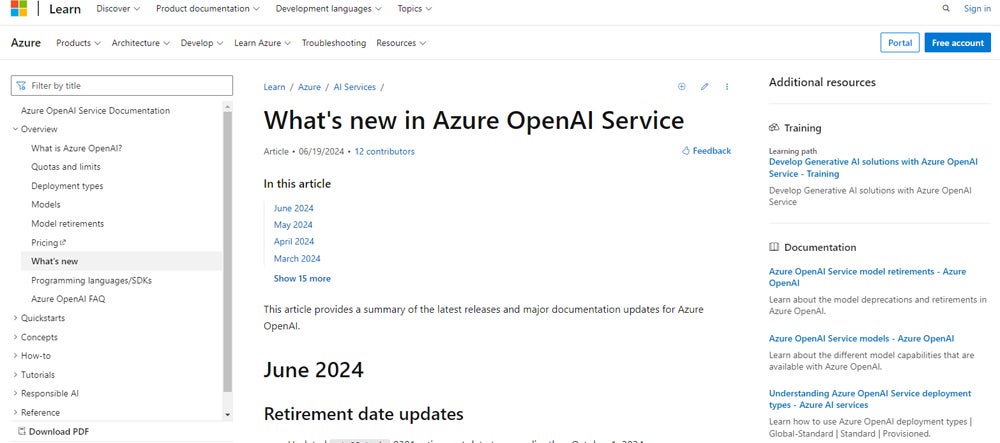
Pros and Cons
| Pros | Cons |
|---|---|
| High availability | Requires platform expertise |
| Impressive role-based access controls | Azure solutions are pricey |
Pricing
Microsoft Azure pricing varies based on your selected service:
- Limited free tier available
- Azure AI Search costs up to $7.68 per hour
- Azure OpenAI Service prices vary by model, context size, token quantity, and other variables
- Contact a sales representative for detailed quotes
Key Features
- Azure OpenAI Service for LLM-powered app development and services
- Azure AI Search for enterprise search and app development tasks
- Azure AI Document Intelligence
- Speech, language, and translation capabilities
- Image analysis and categorization with Azure AI Vision

Best for Data Preparation and Management Resources
Google, a leader in AI and data analytics, has been at the forefront of AI research and development for a long time and in significant ways. In fact, it was a group of Google technologists who ideated and first invented transformer architecture, the neural network design for artificial intelligence that now powers many of the largest AI models and generative AI models on the market today. Google has also made significant contributions to the field of machine learning and deep learning through its development of the TensorFlow framework, an open-source library widely used for building and deploying machine learning models.
While Google is clearly a mastermind behind many AI innovations, it is also an effective provider of various AI and data services, with a platform full of tools that is ideal for data prep and management–the very foundation of AIaaS.
Many of these tools are offered through Google Cloud and Vertex AI, Google’s fully managed platform for AI application and solutions development. For generative AI specifically, Google offers access to Gemini, a collection of multimodal generative AI models and solutions that emphasize user-driven feedback and improvements over time. For users who are most concerned about data lifecycle management and ensuring the data they feed into their AI models is sound, Google offers a number of helpful tools and solutions, including strategic partnerships with Acxiom, CoreLogic, Shutterstock, TransUnion, and Dun & Bradstreet, all of which provide big datasets to Google users who need different types of data to train their AI models.
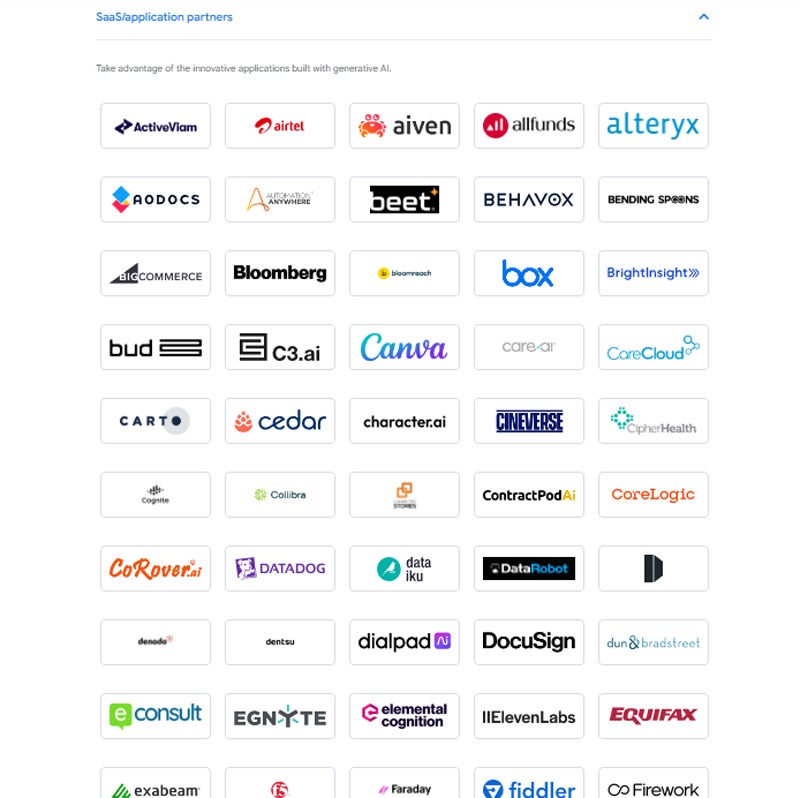
Pros and Cons
| Pros | Cons |
|---|---|
| Straightforward initial setup and model training | Limited customization |
| Integration with Google ecosystem and data partners | Some customer support difficulties |
Pricing
Google’s AIaaS prices vary widely depending upon product, platform, and service:
- Google AI Studio is free to use for certain versions of different Google products and services, including the free version of the Gemini API
- The paid version of Gemini API charges based on rate limits, input quantities, output quantities, and prompt context caching quantities
- Vertex AI is priced based on products, models and machines, data quantities, region, and other variables
Key Features
- Gemini ecosystem of multimodal language models and chat interface
- Vertex AI and Vertex AI Studio for fully managed AI development platform and resources
- User feedback and fact-checking mechanisms
- Partner network for OSS and foundation models, infrastructure, platform, code assist, data, SaaS and applications, and systems integrators
- Google AI and Android developer tools

OpenAI
Best for Generative AI
By the standards of many of the other companies listed in this guide, OpenAI is fairly new and small, a generative AI startup that first took the world by storm when it released ChatGPT to the public in late 2022. But it is the most impressive innovator and product leader in the generative AI landscape, delivering multimodal solutions for text, code, image, and even video generation to business and casual users alike.
While anyone with an internet connection can access ChatGPT’s lower-tier features and functions, business users get additional features and benefits through OpenAI’s business-tier products and services. ChatGPT Enterprise expands context windows, improves enterprise data management and privacy capabilities, enhances analytics, and extends priority support and account management capabilities to business users.
The company’s various API versions allow users to fine-tune, embed, and otherwise customize powerful existing generative models for their specific needs. While OpenAI isn’t necessarily a traditional AIaaS partner since it is more focused on research and development, the business arm of the organization ensures that businesses of all types can get the support they need to develop generative models on an AIaaS basis.
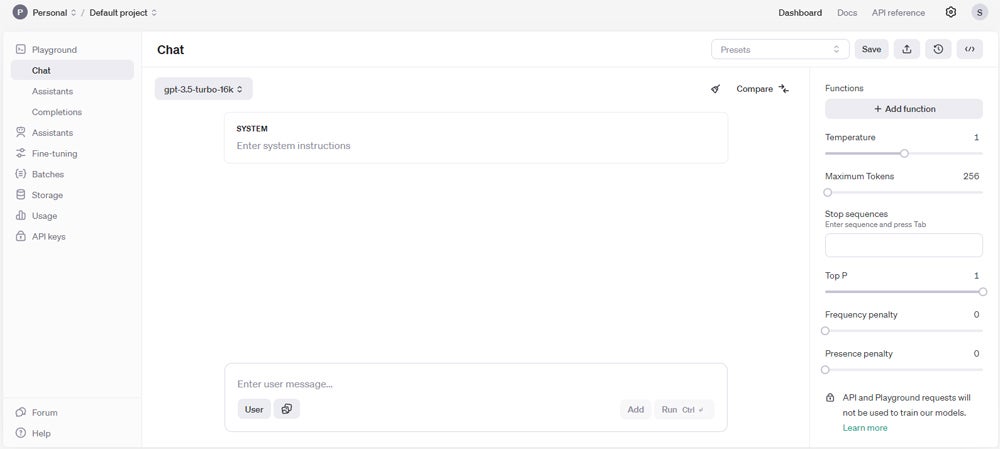
Pros and Cons
| Pros | Cons |
|---|---|
| Pioneering solutions in generative AI | Somewhat limited hands-on service and support |
| Wide range of price points and model options | Capped profit model may limit some innovation and growth opportunities in the future |
Pricing
The company’s pricing plan varies based on whether customers are using it via an API.
API Pricing
Price points listed below are for OpenAI’s flagship models available via API:
- GPT-4o: $5 per 1 million input tokens and $15 per 1 million output tokens
- GPT-4 Turbo: $10 per 1 million input tokens and $30 per 1 million output tokens
- GPT-3.5 Turbo: $0.50 per 1 million input tokens and $1.50 per 1 million output tokens
Find information about other models available via API, including legacy models and fine-tuning models, on OpenAI’s pricing page.
ChatGPT Pricing
- Free: Limited access to ChatGPT features and functions at no cost
- Plus: $20 per month, primarily for individuals who require more advanced features
- Team: $25 per user billed annually, or $30 per user billed monthly
- Enterprise: Pricing information is available upon request
Key Features
- GPT-4o, GPT-4 Turbo, and GPT-3.5 Turbo flagship models available via API
- Multimodal generative AI models
- Account management and custom security reviews by OpenAI experts
- Generative AI app development and embedding in business applications
- Playground for AI modeling experimentation

NVIDIA
Best for AI Hardware and Infrastructure Expertise
NVIDIA is widely acknowledged as a leading AI company, which is well-deserved if you consider the impressive investments, strategic partnerships, and innovative research they’ve moved forward in the past several years. NVIDIA is a unique leader among this list because it provides products and services for nearly all aspects of AI model development, storage, and hosting; most significantly, it is one of the leading providers of GPUs that can handle larger AI models and data loads.
The NVIDIA GPUs are arguably the very foundation of AI hardware, which of course supports infrastructure. Without these ultrafast GPUs, the development of AI would be far slower.
As far as its services go, most are offered through the NVIDIA AI platform, which includes multiple layers of infrastructure, software, and applications to support different users’ needs. This is a particularly strong AIaaS option for specific industries’ niche needs. Healthcare and pharmaceutical customers are a great example of this, as the BioNeMo solution offers mature and easy-to-use technology for complex drug discovery workflows and processes.
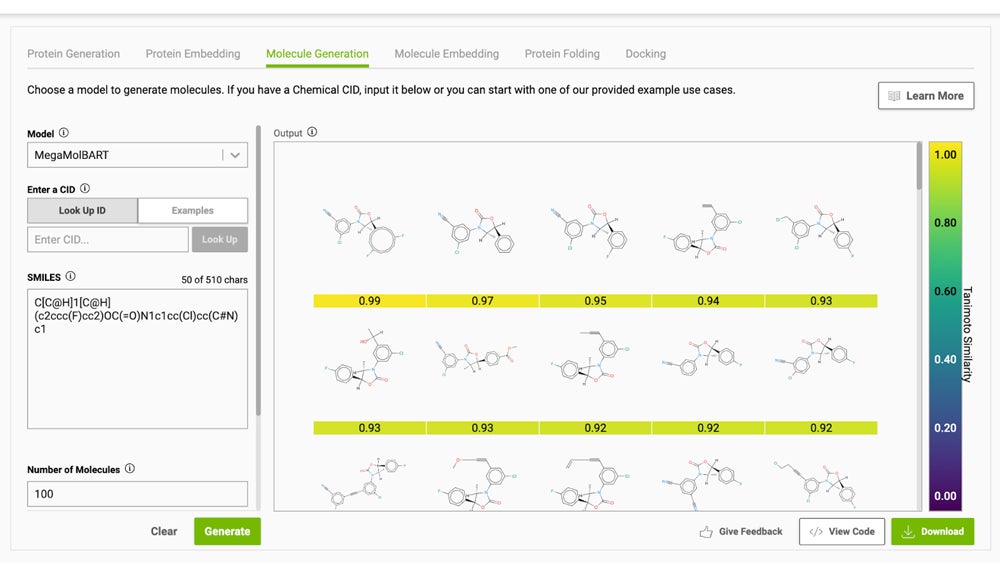
Pros and Cons
| Pros | Cons |
|---|---|
| Hardware expertise and resources, especially with GPUs | Pricing can get expensive |
| Several strategic industry partnerships and collaborations | Specialization in specific industries may limit general use cases |
Pricing
- NVIDIA products and services are not listed with prices
- Contact the NVIDIA sales team directly for pricing information
- Pricing information can be found in the NVIDIA Marketplace for users looking to invest in GPUs or other hardware for AI development
Key Features
- NIM inference microservices in NVIDIA AI Enterprise
- Multilayer approach to NVIDIA AI platform
- Access to NVIDIA and third-party AI models
- Industry-specific AI solutions and offerings, including BioNeMo
- AI training service offered via NVIDIA DGX Cloud

ServiceNow
Best for IT and Business Workflows
ServiceNow is known for its deep focus on automating workflows and improving service delivery across various departments within its customer organizations. With the continued integration of AI into its product and services portfolio over time, ServiceNow has specifically been able to optimize its IT operations management (ITOM) and predictive AIOps services for users. With this maturation, ServiceNow uses AI to help business users identify and predict issues in their business workflows and, from there, automate IT solutions that follow business rules and governance best practices without severely disrupting business operations.
ServiceNow’s ITOM-based services include generative-AI-powered Now Assist, operations footprint discovery, service mapping, certificate management, firewall audits and reporting, service graph connectors, configuration management database, community monitoring and metrics, event management, metric intelligence, health log analytics, and automated service delivery. AI service capabilities outside of ITOM include generative AI, virtual agents, task intelligence, predictive AIOps, automation discovery, and process mining. In sum, clients can assemble a robust AIaaS offering from its many tools.
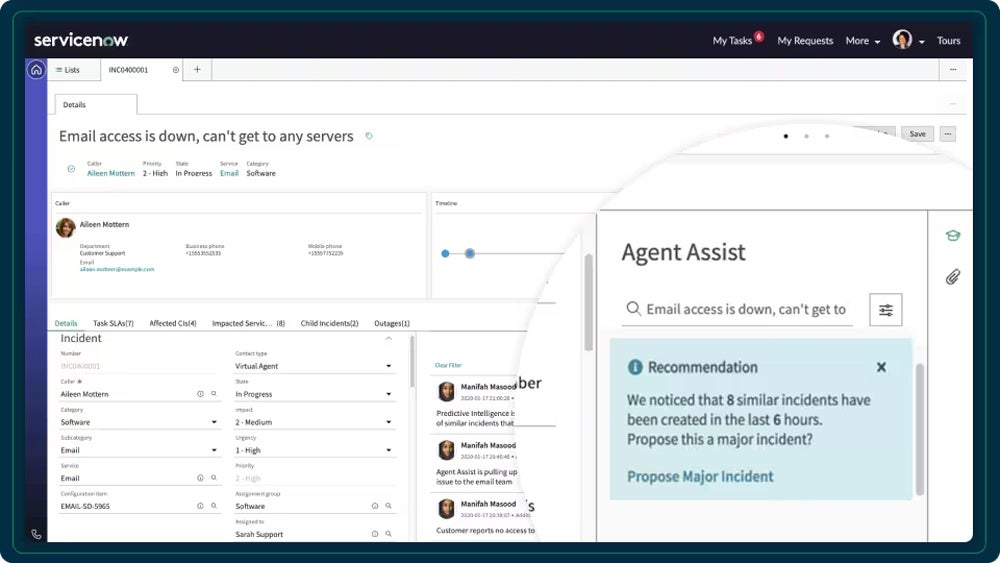
Pros and Cons
| Pros | Cons |
|---|---|
| Advanced automation and remediation features | Steep learning curve |
| DevOps, AIOps, and ITOM workflow optimization focus | Occasional issues with reporting features |
Pricing
- ServiceNow does not directly offering pricing information
- Prospective buyers should book a demo to learn more about the platform
- Customer requirements are used to create custom rates
Key Features
- Now Assist generative AI embedded into all ServiceNow workflows
- AI agents and customer service solutions
- Supportive AI apps for generative AI, process mining, predictive AIOps, AI search, and workforce optimization
- AI-automated IT operations management (ITOM)
- Compatibility with on-premises and cloud environments
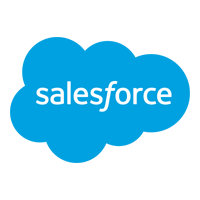
Salesforce
Best for Marketing and Sales Teams
Salesforce is the leading provider of cloud-based CRM technology and has cemented that lead with its commitment to developing innovative AIaaS platform for marketing and sales use cases. The Einstein 1 Platform is its collection of AI, data, and cloud-specific solutions that allow users to create generative AI apps and infuse AI into different business workflows. The platform is integrated into all aspects of the Salesforce platform, including Sales Cloud, Service Cloud, Marketing Cloud, Commerce Cloud, and Heroku.
The Salesforce and Einstein combination enables businesses to build AI-powered apps, automate processes, and gather insights to transform customer experiences at all stages of the customer lifecycle. Einstein AI can perform complex tasks such as natural language processing, predictive analytics, and machine learning to automate operations and uncover insights into customer data and behavior. It can also help to generate multimodal content for AI marketing campaigns and sales mediums, all of which help these teams to spend less time creating content and collateral and more time developing the strategy behind these materials.
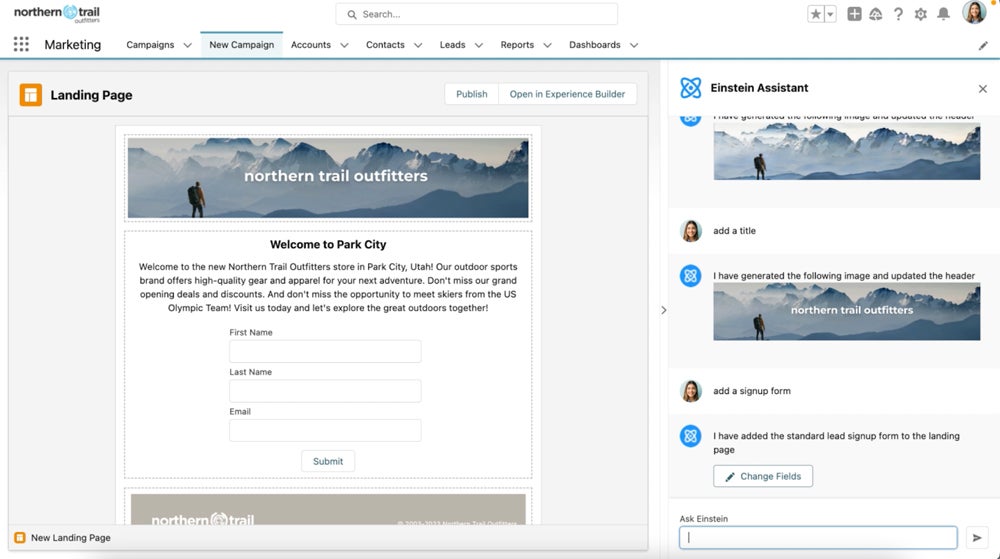
Pros and Cons
| Pros | Cons |
|---|---|
| Einstein Trust Layer for managed privacy and security at scale | Somewhat limited end-user customization |
| Einstein built into and customized to individual cloud hubs | Some problems with Tableau CRM features |
Pricing
While most Salesforce products and tiers include some basic AI capabilities, only higher-level tiers include Einstein AI features or other advanced AI services. These are the best subscription options for interested users:
- Einstein 1 Sales: $500 per user per month, billed annually
- Einstein 1 Service: $500 per user per month, billed annually
- Marketing Cloud Growth Edition: $1,500 per month, billed annually
- Einstein 1 Platform Starter: $25 per user per month, billed annually
- Einstein 1 Platform Plus: $100 per user per month, billed annually
Key Features
- Einstein Copilot for built-in AI assistance and workflows
- Copilot and AI customization through Einstein 1 Studio
- Sales, Marketing, Customer Service, and Commerce Cloud-specific Einstein applications and use cases
- Low-code AI builders
- Einstein Trust Layer for security and privacy guardrails
For an in-depth view of how Salesforce AI aids business, see the eWeek guide: Salesforce and AI: How Salesforce’s Einstein Transforms Sales

MonkeyLearn
Best for Text Analysis
MonkeyLearn is one of the best text analysis tool and service providers in the market. It not only offers high-quality services but also meets the cost and accessibility AIaaS needs of smaller and midsize businesses. With MonkeyLearn, users can access a repository of pre-trained AI models or train their own models to handle different tasks such as sentiment analysis, topic classification, keyword extraction, and content categorization.
With customer sentiment analysis, users can know their customers’ opinions about their products and services in greater depth and typically with more proactive notice. This level of insight can be used to improve their customer experience and determine future directions for the business. MonkeyLearn also makes it easy to analyze large amounts of unstructured data, such as social media posts and customer reviews.
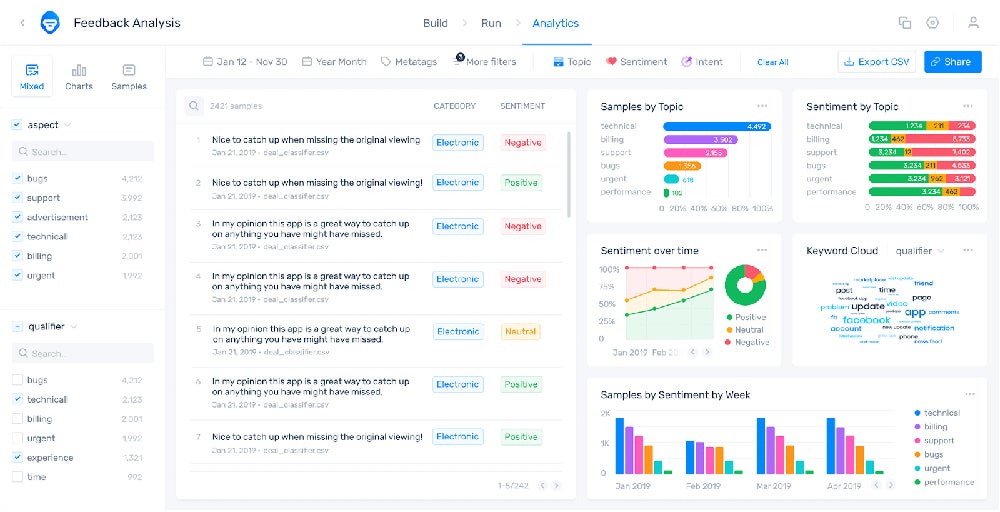
Pros and Cons
| Pros | Cons |
|---|---|
| Highly customizable solutions for small businesses and budgets | Smaller footprint and fewer internal resources |
| Access to low-code/no-code text analytics | Limited third-party integrations |
Pricing
- MonkeyLearn does not discuss pricing on its website
- Third-party sites indicate that plans start at $299 per month for 10,000 queries per month
- MonkeyLearn Studio and educational access may also be available at little to no cost
Key Features
- Color-coded, multi-format data visualizations
- No-code text analytics and business templates
- Text classifiers and extractors
- NPS, review, CSAT, support, survey, and VoC analysis
- Prebuilt and customer machine learning models

DataRobot
Best for Hands-On Support
DataRobot is an enterprise AI service provider that helps companies build and deploy AI and machine learning models. It offers focused, hands-on support, which is essential for navigating the complexities of AI development.
The DataRobot platform uses automated machine learning techniques to streamline the model development process and automates various steps, such as data preprocessing, feature engineering, model selection, and hyperparameter optimization. Users appreciate this vendor’s thoughtful approach to AI governance, data governance, and strategic lifecycle management for AI models. The platform is also designed specifically for enterprise requirements, meaning it can handle larger AI workloads without introducing major lag times or performance problems into the mix.
Through DataRobot’s AIaaS approach, users can get started with their Foundational Package, which includes guided onboarding, ongoing access to applied AI support and DataRobot University, and real-time technical support. At an additional cost, customers can also subscribe to Specialty Packages services, which cover everything from additional training and hackathons to model governance and strategic AI roadmapping. Most recently, DataRobot has introduced the DataRobot Generative AI Catalyst Program, a new service program focused on upskilling, building, and developing strategic AI initiatives for your organization.
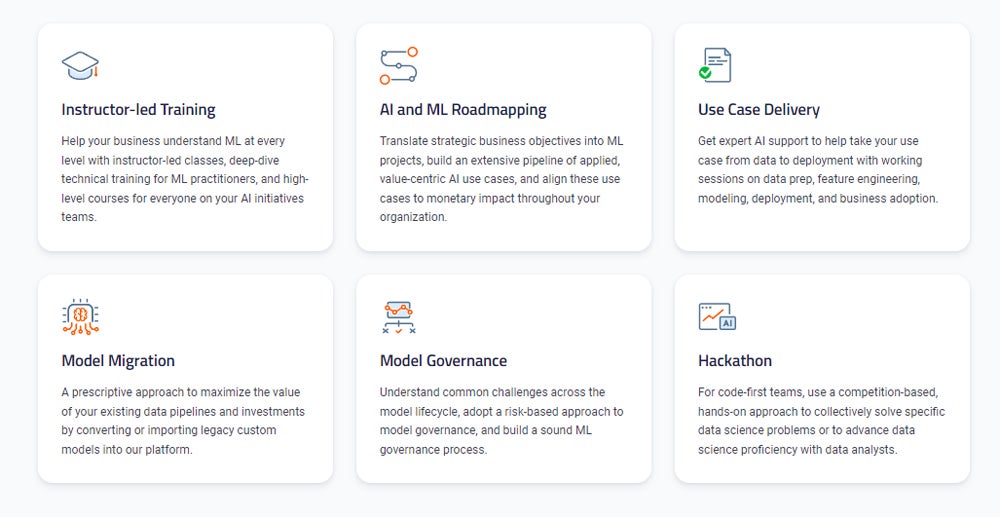
Pros and Cons
| Pros | Cons |
|---|---|
| Speedy processing for large data quantities | Can be expensive |
| Specialty service packages and support resources | Clunky user interface |
Pricing
- Contact the DataRobot team directly for pricing information
Key Features
- Open ecosystem for data, APIs, and applications
- AI governance with registration, auditing, and documentation features
- Cloud, technology, and services partners, including NVIDIA, Google, Microsoft, and AWS
- Code-first AI accelerators for generative and predictive AI development
- Specialty service packages for training, AI and ML roadmapping, use case delivery, model migration, model governance, and hackathons
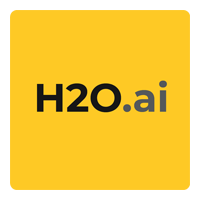
H2O.ai
Best for Industry-Specific Service Solutions
H2O.ai is a provider of artificial intelligence and machine learning technologies and services that are mostly powered by AutoML and no-code deep learning engines. In addition to more traditional closed-source, fully-managed models and services, the company also provides open-source software, support, and services for developing complex and custom machine learning models.
To truly differentiate itself as an AIaaS provider, H2O.ai has invested heavily in researching and developing comprehensive service packages for specific industries, including finance, government health, insurance, manufacturing, marketing, retail, and telecommunications. Among its specialized, industry-specific solutions and use cases are features for claims management, hospital capacity simulation, fraud detection, predictive fleet maintenance, lead scoring, and clinical workflow management.
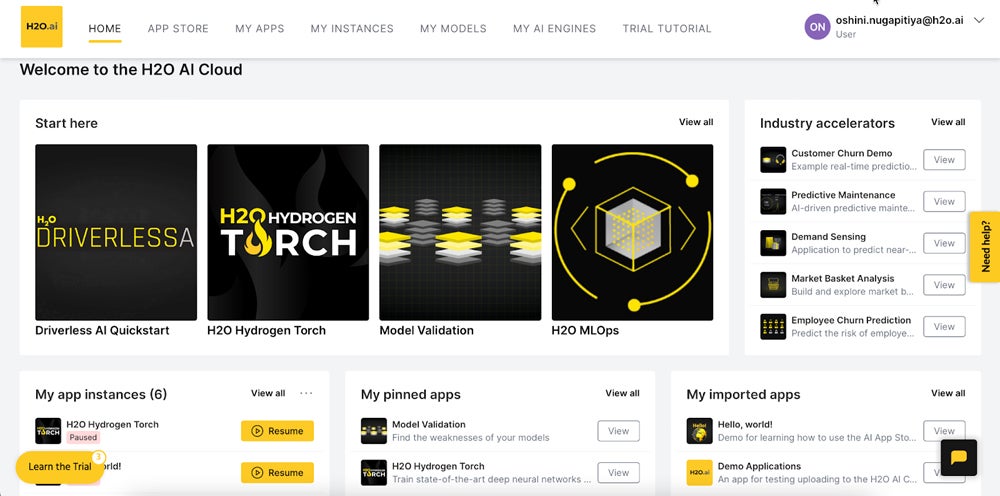
Pros and Cons
| Pros | Cons |
|---|---|
| User-friendly interface supported by a large user community | Issues with documentation |
| Models can handle complex, large datasets | Expensive for smaller businesses |
Pricing
- H2O.ai doesn’t disclose rates on its website
- Prospective buyers should contact sales for quotes
- Publicly available data shows that H2O.ai Cloud costs $50,000 per unit
- For some third-party vendors, such as AWS, users must pay for at least four AI units to access the platform
Key Features
- H2O AI Cloud with multiple deployment options
- H2O.ai Hospital Occupancy Simulator
- GenAI App Store and Gov GenAI App Store for public-sector-specific solutions
- Enterprise h2oGPTe and H2O LLM Studio
- Generative and predictive AI solutions in both closed-source and open-source formats

Oracle
Best for Custom Business Use Cases
Oracle is a veteran in the enterprise technology business, long offering database and cloud technologies that work for different data types and use cases. It only seems natural, then, that Oracle has been able to jump into this group of top-tier AIaaS providers, especially in its Oracle Cloud Infrastructure (OCI) platform that provides the necessary foundation for extensive, custom AI development.
OCI is the Oracle platform where its most advanced AI software and services are found, including several multimodal generative AI capabilities and services that focus specifically on generating text, speech, image analyses, and document analyses based on user inputs. The diversity of OCI AI tools means that Oracle is a great solution for businesses that want to use AI to contextually analyze multiple data formats in their business. Outside of OCI, there is also Machine Learning in Oracle Database, a solution that adds in-depth AI-driven insights and support to users of various Oracle database products.
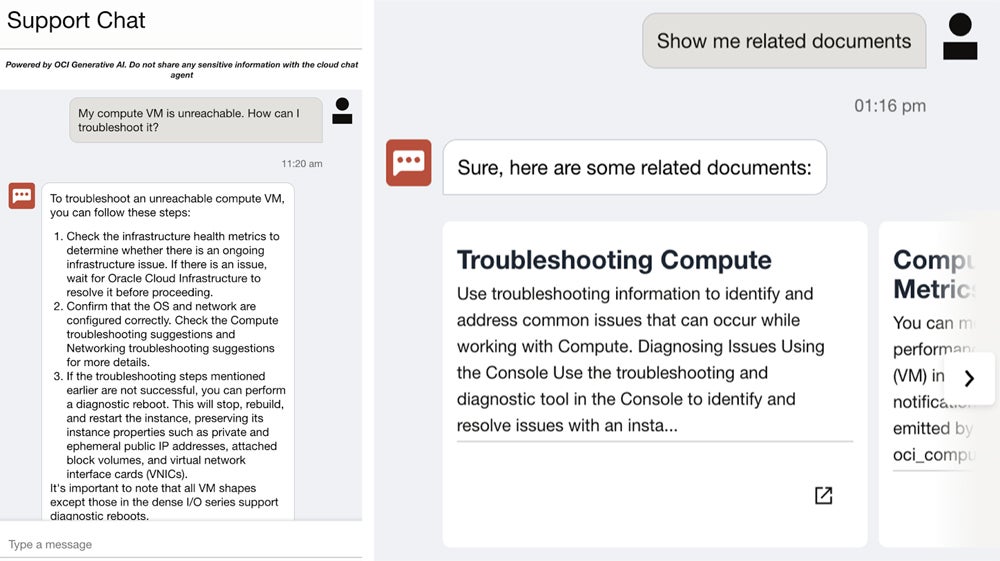
Pros and Cons
| Pros | Cons |
|---|---|
| Strong sentiment analysis capability in OCI | High-end costs |
| High availability and fault tolerance | Lagging technical support response times |
Pricing
Many Oracle services, especially those offered through OCI, are priced per unit used:
- Units may be training hours, transactions, transcription hours, inference unit hours, or requests, depending on selected products and services
- Several Oracle AI and ML services are also available through Oracle’s free pricing tier
- Contact Oracle’s sales team for more information
Key Features
- OCI Generative AI Agents feature
- OCI Digital Assistant with prebuilt conversational AI and chatbots
- Text analysis, speech-to-text, and text-to-speech services
- OCI Vision for image analysis and OCI Document Understanding for document analysis
- Machine Learning in Oracle Database with machine learning notebooks, monitoring, language-specific solutions, and more
The Future of AIaaS
With several key trends and developments, the future of AI-as-a-Service is promising. Here are some potential directions for the future of AIaaS:
- Increased Adoption and Democratization: As AI technologies continue to mature and demonstrate their value across various industries, the adoption of AIaaS is likely to increase in areas like healthcare, finance, retail, and manufacturing. As AIaaS becomes more accessible and user-friendly, it will empower non-experts to leverage AI technologies effectively. This democratization will enable a broader range of users and businesses to harness AI for various applications.
- Growth of Advanced AI Models: AIaaS providers will continue to develop and deploy more advanced and specialized AI models to tackle complex problems. This may mean AIaaS in the future may be capable of more autonomous taskwork.
- Edge AI and IoT Integration: With the proliferation of Internet of Things (IoT) devices, AIaaS will likely integrate more closely with edge computing capabilities to bring AI processing and inference closer to the data source. This shift will reduce latency, improve response times, and enhance privacy and security.
- More Industry-Specific Offerings and Specialization: While most AIaaS vendors currently offer more general services in generative and predictive AI or machine learning model development, a growing number of these vendors are specializing in specific industries and use cases. Expect this trend to continue and grow, especially as the competition for market share grows fiercer.
- Greater Emphasis on Ethical and Explainable AI: Consumer demand and a growing body of AI regulations–particularly the EU AI Act–are leading AI companies of all backgrounds to work on more transparent, ethical, and explainable AI. This will be especially important for AIaaS vendors now and in the future, as their stakeholders include both the companies subscribing to their services and any end users or consumers who may be impacted by murky or unethical use cases.
How to Choose the Best AI as a Service Company
Choosing the best AIaaS company to partner with can be difficult if you aren’t familiar with the services they offer and the services you actually need.
Industry-Specific Specialization or Experience
Several AIaaS companies specialize in certain industries and use cases, or they can at least demonstrate experience working in those industries. Particularly if you operate in a highly regulated industry, such as healthcare or the public sector, be sure to identify partners with the right experience and strategies for your needs.
Range of Products and Services
As a general rule of thumb, consider a provider that offers a wide range of AI capabilities, such as natural language processing, computer vision, machine learning, or deep learning, depending on your requirements.
Budget and Pricing Approach
Evaluate the pricing model and cost structure of the AIaaS provider. Consider factors such as subscription fees, usage-based pricing, or any additional costs for customization, training, or ongoing support.
Compatibility with Data and Infrastructure Requirements
Depending on the partner you select, you may be self-hosting or hosting solutions in their environments, you may be providing your own data or benefiting from their provided data sources, or making several other decisions about how your chosen services work with your specific data and infrastructure needs. Consider whether your preferred vendor is compatible in this way, and also consider if there will be any additional costs that come with them managing any of these components for you.
Customizability
Many AIaaS offerings can be customized or fine-tuned to your business use case or application requirements. If this is an important feature to you, talk to prospective partners about how they support smooth, user-friendly customizability and co-creation opportunities.
Scalable Platforms and Resources
As your organization’s AI needs grow, you’ll want to partner with an AIaaS provider that can scale with you. Look for providers with elastic pricing and resourcing structures, and be sure to discuss any other scalability advantages with prospective vendors from the outset so you know what to expect and what’s possible.
Ability to Integrate with Existing Tech Stack
Chances are, you’ll already have existing cloud, security, and SaaS applications and platforms that are a crucial part of your tool stack. The best AIaaS provider for your business is likely one that can set up smooth integrations between their products and services and the most important components of your existing tool stack.
Accessible and User-Friendly Customer Support
AIaaS is not just about the technology but about the service delivery. That’s why it’s important to evaluate customer support availability and quality, both by looking at the details of their support pages and reviewing customer reviews about customer support experiences.
Vendor Reputation
Your chosen AIaaS vendor does not need to be the biggest and priciest provider on the market. Often the scrappier and smaller AIaaS vendors will have more of the specialized solutions and hands-on care that you require. But it is important to find a vendor with a solid reputation that consistently meets customer expectations. To determine if the vendors you’re evaluating are high-quality partners, take the time to talk to existing customers, review case studies and testimonials, and look to other third-party sources of information about how that vendor operates.
Bottom Line: AI-as-a-Service Companies Democratize Access to AI
AI as a service companies offer businesses easier access to cloud-based artificial intelligence technologies, a feat that is otherwise nearly impossible for most companies to achieve on their own due to a lack of resources and limited internal expertise. As demand for this type of service grows, AIaaS companies are democratizing access to artificial intelligence and helping businesses discover new insights and automate digital processes without worrying about infrastructure or hardware investments.
As more companies realize the value of investing in AI to keep up with the competition across industries and sectors, expect AI as a service companies and their offering to continue evolving in maturity and capabilities.
To gain a deeper understanding of today’s top large language models, read our guide to Best Large Language Models
